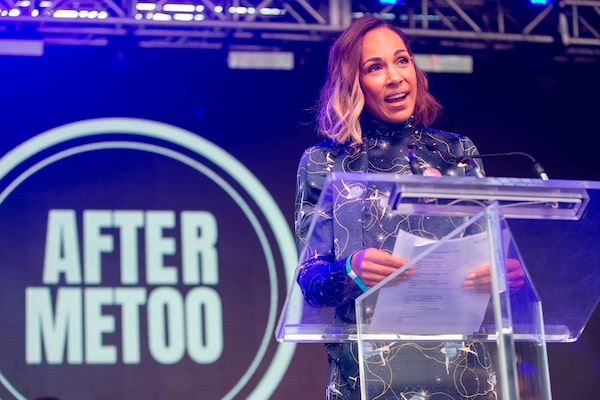
Actress Amanda Brugel speaks during the "Share Her Journey," a rally for women in film, at the Toronto International Film Festival in Toronto on September 8, 2018. (Photo by Geoff Robins / AFP)GEOFF ROBINS/AFP/Getty ImagesGEOFF ROBINS/AFP/Getty Images
As hundreds gathered on Saturday at a rally for gender equality in the movie business, an event organized by the Toronto International Film Festival, there were surprisingly cool fall breezes and predictably rousing calls for change – but most of all there were many practical ideas about to reshape the entertainment industries.
“What a difference a year makes,” said TIFF executive director Michele Maheux, referring not only to the fall of Hollywood mogul Harvey Weinstein and the rise of #MeToo, but also to the festival’s launch of Share Her Journey, a campaign to boost female careers in film that predated the dramatic events of last fall. “Women have been a central part of the conversation, in the news, and we have made much-needed noise. Collectively we have managed to shake the unshakeable.”
TIFF 2018: How the film festival hopes to fix a broken industry, while still celebrating it
TIFF 2018: Women take the lead on day three
Organized by TIFF vice-president of advancement Maxine Bailey, Share Her Journey set out to help address the gross gender imbalance that exists on film sets where the large majority of directors, writers and cinematographers are men. But the TIFF program really caught fire alongside #MeToo and Saturday’s rally brought together a wide range of speakers associated with such groups as #AfterMeToo, a Canadian campaign to help the victims of sexual harassment, and ReFrame, a Hollywood initiative that includes certification for movies and TV shows that are gender inclusive.
Actress Geena Davis, who runs an institute dedicated to getting more female characters on screen in children’s entertainment, was the first in a lineup of nine speakers. She recommended that writers and producers do a “gender pass” on every script: “Ask who here could become female … Change a bunch of first names. Where it says ‘a crowd gathers’ write in the script: ‘Which is half female.’”
Mia Kirshner, the Canadian actress who co-founded #AfterMeToo, explained her proposal for a digital platform which she has dubbed Rosa and which would harmonize all the different reporting mechanisms for sexual violence in the industry, offer victims live telephone support and connect them with legal advice.
“Conditions that produce sexual violence are a distraction from our excellence,” she said.
The crowd also heard from Dr. Stacy Smith of the University of Southern California, a leading researcher on gender equality and the instigator of inclusion riders in Hollywood contracts, a mechanism whereby movie stars can use their power to insist that the sets on which they are filming have a diverse workforce. Smith stressed the need for including women of colour in the industry, saying, “female is a buzz word in Hollywood for a white woman.” She praised Warner Media for coming out with an inclusion initiative for the movies, shows and games it produces, saying the public needs to hold media companies accountable for diversity. She also promised a forthcoming study, from researchers at the Annenberg Inclusion Initiative she directs, that would show the economic power of entertainment created by women and people of colour.
The myth that female stories are not as commercially viable as ones about men was dismissed by Keri Putnam, executive director of the Sundance Institute. She also rejected the notion there is any shortage of female talent or that women don’t make strong leaders on film sets. She said women are very involved in new entertainment technologies such as VR and augmented reality, but warned that as those media become more commercially lucrative,women may get shunted aside, repeating a process similar to the early days of Hollywood as men took over what was increasingly becoming a big business.
Addressing a crowd of several hundred people that included almost as many men as women, Canadian actress Amanda Brugel talked about working with male allies to eliminate sexual harassment, asking men to publicly call out inappropriate behavior when they see it. She also suggested everyone could make an effort to amplify women’s voices on social media simply by consciously seeking them out and sharing their posts.
The crowd also heard personal stories from female creators about some of the barriers they continue to face. The British director Amma Asante, who has brought her new film Where Hands Touch to TIFF, talked about the difficulty of making a movie about a black teenager who falls in love with a member of the Hitler youth: She was told that a movie set in Berlin in 1944 “was too big for me” because the industry unconsciously assumed war movies were made by white men not black women.
As the sun finally emerged and the day warmed up, Asante also expressed a wish to be somewhere else.
“Oh to live in a world where any black woman creator, any woman artist, did not have to stand on a platform,” she said. “Every day I dream of a world where the necessity of speaking about this is absent, where my fellow women artists can speak about their work rather than campaigning to do it.”
 Kate Taylor
Kate Taylor